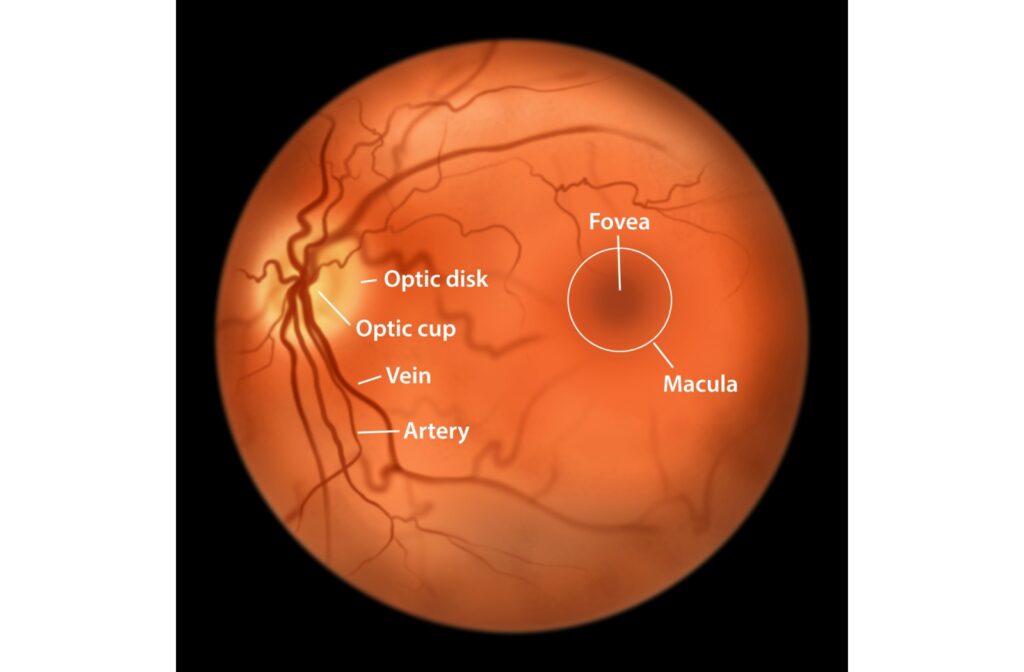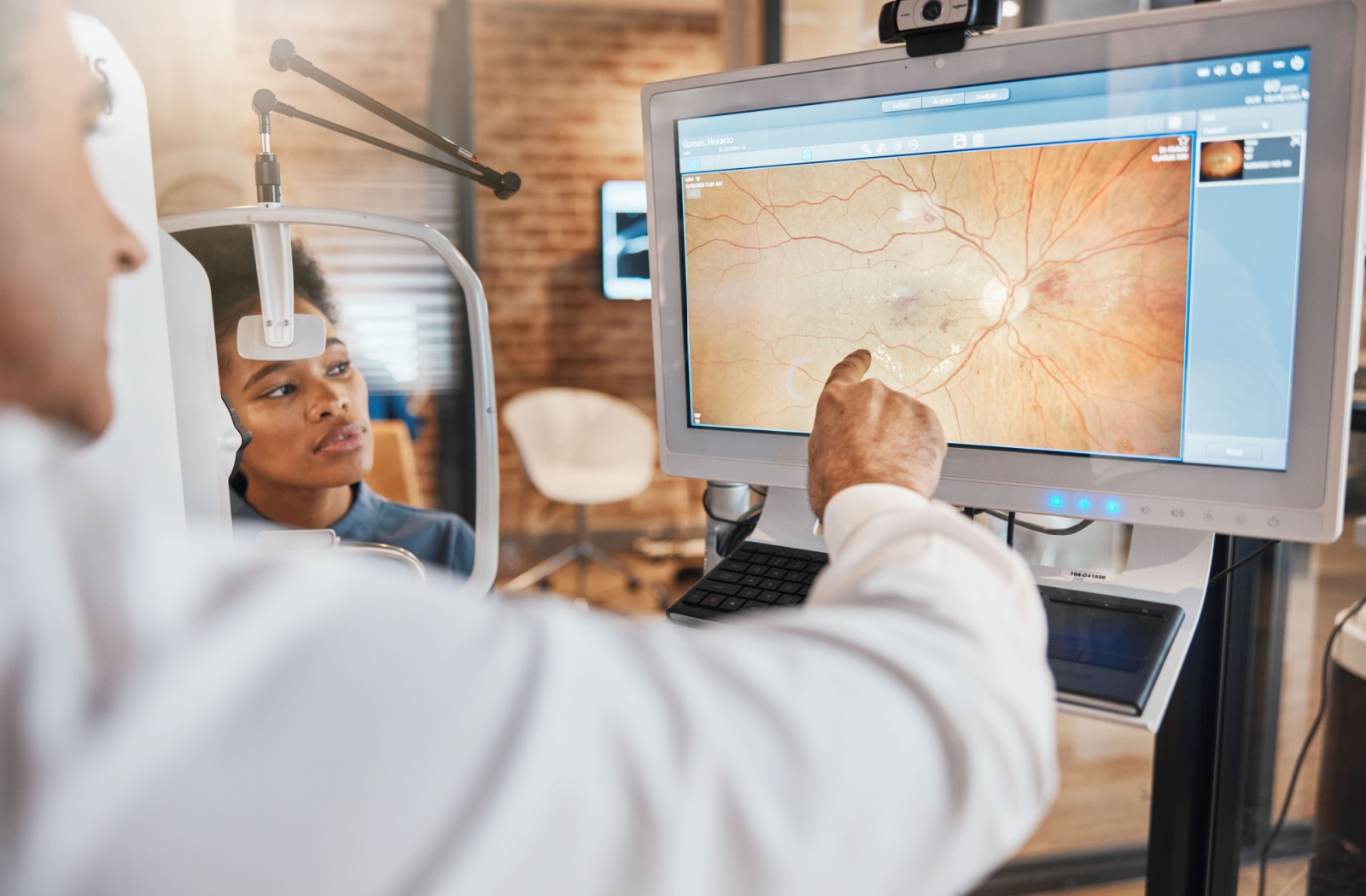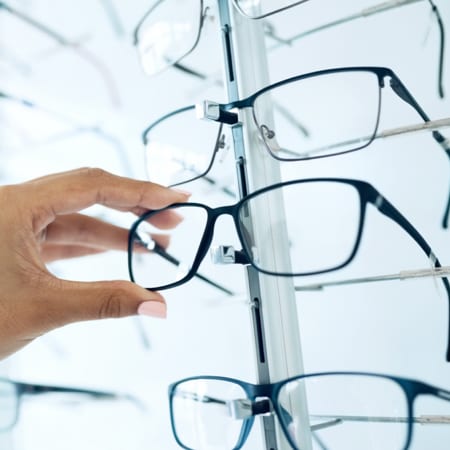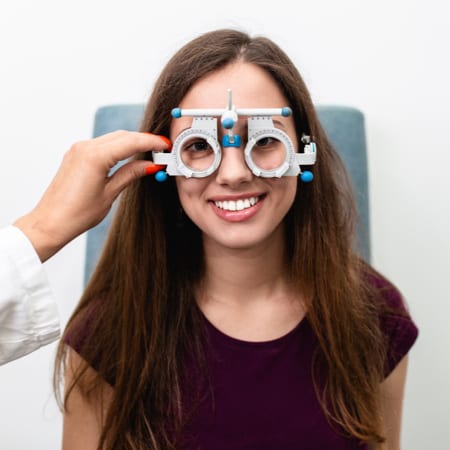Living with diabetes means keeping a close eye on your overall health — including your vision. Changes inside your eyes often happen quietly, without early warning signs. That’s why a regular diabetic eye exam is so important for protecting your sight.
A diabetic eye exam is a comprehensive medical assessment designed to check for and monitor eye conditions that can develop as a result of diabetes. We look deep inside your eye, beyond what a standard vision test can show, to protect your sight. It’s a key part of your long-term health management.
Whether you were recently diagnosed or have been managing diabetes for years, these specialized exams can catch changes early, often before you notice any vision problems.
Why Your Eyes Need Special Care With Diabetes
Diabetes can affect the small blood vessels throughout your body, including the ones in your eyes. Over time, these changes can impact your retina—the light-sensitive tissue at the back of your eye. These effects can happen slowly and quietly.
Many serious eye conditions related to diabetes do not have obvious symptoms in their early stages. You might not notice any changes to your vision until the condition is more advanced. This is why proactive care is so valuable.
Regular, specialized eye exams allow us to detect signs of trouble long before you notice them. Early detection can help us manage these changes and protect your vision for years to come. It gives you the best opportunity to maintain your eye health.
A Diabetic Eye Exam & Your Eye Care
Start with Your Health History
We start every diabetic eye exam with a conversation about your health. We’ll discuss how you manage your diabetes, any symptoms you may have noticed, and your overall medical history. This helps us get a complete picture of your unique health situation.
This discussion allows us to personalize your care and track any changes from one appointment to the next. It’s also your time to ask us any questions you have. We want you to feel informed and comfortable with every step.
Assess Your Vision & Eye Pressure
Next, we check how clearly you can see using a standard eye chart. This gives us a baseline of your current visual acuity. We also test the pressure inside your eyes—a simple and painless measurement.
Monitoring your eye pressure is important, as diabetes can increase your risk for other conditions like glaucoma. These initial tests provide valuable information about your eye function. They are just one piece of a much larger puzzle we put together during your exam.
Dilation Gives a Clearer View
To see the back of your eye clearly, we need a wider view. We use special eye drops to gently and temporarily enlarge your pupils. This process is called dilation, and it’s a key part of every diabetic eye exam. A dilated pupil allows a clear view of the internal structures of the eye, which is essential for a thorough check.
Once your pupils are dilated, we can get a complete and unobstructed look at your entire retina, optic nerve, and blood vessels. This allows us to perform a thorough health check. The effects of the drops wear off after a few hours.
See More with Advanced Technology
A large part of our approach to eye care is our investment in modern technology. We use advanced instruments like retinal cameras to capture detailed digital images of the back of your eye. This helps us see things with incredible clarity.
This technology can reveal tiny changes to your blood vessels that might otherwise be missed. We implement our technology seamlessly into your exam to get the most accurate view of your health. These images also become part of your permanent medical record.
By comparing these images over time, we can carefully track the health of your eyes. This allows us to monitor even the smallest changes from year to year. It is an important part of our comprehensive management of eye diseases.

Detect Diabetic Retinopathy & Other Concerns
Look for Signs of Retinopathy
One of our primary goals during the exam is to look for signs of diabetic retinopathy. This condition affects the tiny blood vessels in your retina and is one of the leading causes of vision loss for people with diabetes. According to Diabetes Canada, regular monitoring is crucial to prevent diabetes-related eye damage.
We carefully examine these vessels for any signs of leaking, swelling, or abnormal growth. Finding these changes early is the first step toward managing the condition. We can then create a plan to help protect your vision.
Check for Other Eye Conditions
Having diabetes can also increase your risk for other eye health issues. A comprehensive exam allows us to screen for a range of potential concerns at the same time. This gives you a complete picture of your eye health.
During your exam, we also check for conditions such as:
- Cataracts
- Glaucoma
- Diabetic macular edema
By looking for multiple conditions, we make sure that your exam is as thorough as possible. It is a complete health check for your eyes.
How Often You Need Regular Eye Exams
If you have Type 1 diabetes, we recommend your first comprehensive eye exam within five years of your diagnosis. For those with Type 2 diabetes, it’s a good idea to schedule an exam soon after you are diagnosed. This establishes an important baseline for your future care.
After your initial exam, your optometrist can help you create a regular monitoring schedule. For most people with diabetes, this means scheduling a comprehensive eye exam at least once a year. Consistency is key to proactive eye care.
Your Exam Coverage & Our Eye Care Team
Use Your Health Coverage
In Ontario, the provincial health plan generally covers a major eye exam once per year for individuals with diabetes. This coverage is in place because these exams are considered a medical necessity. It helps make this important care accessible.
Our team can help you understand your coverage and how it applies to your appointment. You can find more details on our insurance and payment information page. You can focus on your health knowing that this preventative care is supported. We can answer any questions you have about the process.
Work With Your Health Team
We believe in a team-based approach to your health. We see ourselves as an important part of your overall diabetes care team. Your vision is closely linked to your general wellness.
With your permission, we can share our findings with your family doctor or diabetes specialist. This collaboration helps ensure everyone involved in your care has the information they need. It supports a more complete approach to your health.
Book Your Diabetic Eye Exam in Woodstock
You deserve to keep your vision clear and healthy at every stage of life. Our team at Woodstock Vision Care has proudly cared for families in the Woodstock community for many years, providing thorough, compassionate diabetic eye care.
A regular diabetic eye exam can help detect changes early — often before you notice symptoms — so you can protect your sight for the long term.Book your diabetic eye exam today and take the first step toward safeguarding your vision for years to come.
















